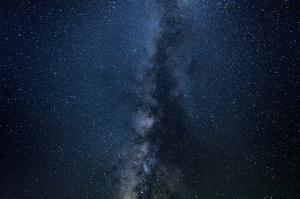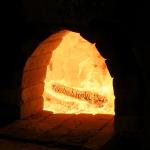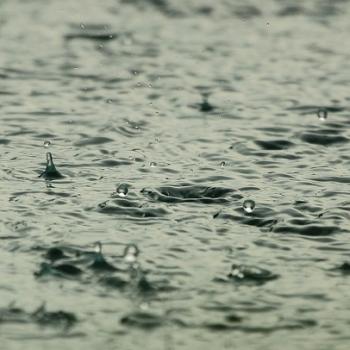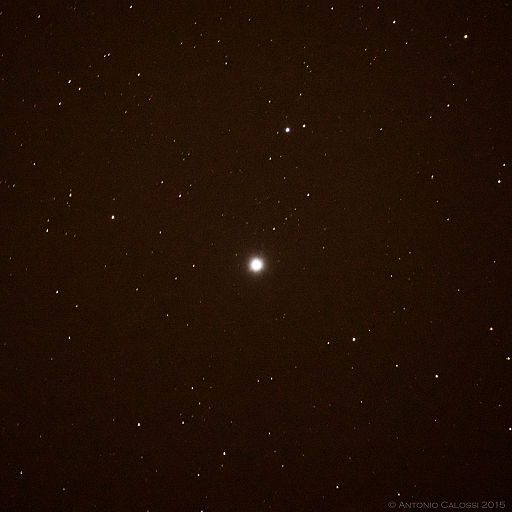
[I wrote this short story in 2017, but a lot of the links to the second page in my old two-page posts are broken now, so I’m publishing a revised one-page version here. All persons trying to find a moral in it will be drug out into space and zapped. ]
“Are we going to Polaris?” asked the old woman across the aisle.
Why anyone would want to get off the bus on Polaris Parkway, I didn’t know. There’s not even a sidewalk there, just one little island of pavement and an ash tray. You have to risk life and limb crossing a four-lane street to get off the island and into the strip mall; even then, it would take five minutes to walk across the parking lot.
“Polaris is a hole in the sky,” said the other woman, who was sitting next to me.
This woman was new. She was middle-aged with mousy hair, each strand a different shade of dishwater brown. She wore a tan knee-length dress so plain and unadorned it could have gone without notice at any time in the past fifty years. Everything about her could have gone without notice– so much so that it was unnerving, like talking to the seat behind her instead of to a human being.
The old woman was still looking at me, with a smile I didn’t like. Hers was one of the faces I’d seen every few days on the bus this summer. She never seemed to remember what route she was taking, or where the stops were. Her skin was creased like desert soil, or the skin of a walrus; her thin gray hair barely covered her scalp. Her eyes were light blue, and piercing.
“Why are you going to Polaris?” I asked.
“Polaris is a hole in the sky,” repeated the dishwater woman.
Something about that statement sounded familiar to me. I glanced back at the old woman, who was staring at her toes– she wore black, peep-toed shoes and ugly gray stockings. Her dress was black with little white polka dots– the stereotypical picture of a frumpy old woman’s dress, from any time in the past fifty years. I wondered who had picked it out for her. Her hands were disfigured, arthritic knobs; she couldn’t have dressed herself.
“Are you going to Polaris with us?” the middle-aged woman asked.
“No,” I said.
“Not today,” said the old woman.
I looked out the window– sheets of rain were falling, drenching the smudged glass in river after oily river. I could barely see beyond it. Somewhere out there were two lanes of gray road with red tail lights passing us, and a gray median strip; then two lanes of gray road with white headlights approaching us impossibly fast. The cars that passed were somewhat visible through the water, but the cars on the far side were only headlights and a barely perceptible whir.
“When I was a little girl” I said, remembering, “ I had a book of folktales. I must have read it a hundred times. It said that several Native American tribes believed that there were many different worlds, in layers one on top of another, and the sky of one world was the ground of the next. There were worlds below the earth, and their sky was our ground. And there was a world above us where our sky was their ground. The way to get up to the sky world, was to go through Polaris. Polaris was a hole in the sky.”
“They aren’t wrong,” said the middle-aged woman.
I tried to look at her again, but her very ordinariness was so uncanny that I couldn’t.
I’d slept heavily for a couple of nights now, but it wasn’t enough. There was no way to get as much sleep as I needed. Nothing made me feel awake. My whole body felt different—I’d known that it would, of course, but this was worse than I’d thought. It wasn’t at all as if there was a body growing inside of me. The sensation was closer to being inside someone else’s body: a person with an annoyingly keen sense of smell, who gagged at my favorite foods. Her sense of touch was stronger than mine. Tags and buttons put her in agony. She couldn’t stand the feeling of pajamas rubbing against bedsheets. She was exhausted.
In this state, I wasn’t capable of judging whether anything was unusual or not. It could be that what the woman was saying was perfectly normal, and I was the one who was confused.
“Polaris is the last stop.” The woman’s voice was like her appearance—impossibly ordinary, soft as the poems that ran through my mind when I didn’t have time to jot them down. Not a voice with characteristics, just a voice. “If we could get to Polaris, we could go outside. Really. We could go outside for the very first time. You’ve never been outside in your life, you see. You think you have, but you haven’t. The sky is a lid they threw on top of us. It goes bright blue when the sun shines, and we call that a nice day because we think we can see so well. But we see so much more when it’s dark.”
The woman was holding my hand now. I didn’t realize she’d done that. Her touch was unremarkable as anything else about her.
I was glad she hadn’t reached to grab my stomach. I was dreading the day that would begin.
“When it’s dark,” the woman went on, near a whisper, “They can’t sustain the blue. The blue is an illusion they throw up to hide all the holes. Everyone can see the holes at night. We call them stars. We chart their paths. We use them to trace shapes and tell our fortunes. Everybody knows they’re important, but we forget what’s most obvious: the stars are holes in the lid. They were drilled to let the steam out so we don’t suffocate. If we got close to them, we could get out too. Then you’d be outside for the very first time. Then you’d be free, and they couldn’t make you do anything anymore. You could have anything you wanted. Once you’ve been up there, they can’t make you go back down.”
“Are you sure about that?” This wasn’t a particularly clever thing to say, but the woman had paused as if she expected me to say something.
The woman had been smiling; she frowned now, and sunk against the back of the seat. “No. At least… I’m sure the stars are holes. But what if, when we got outside, we found another lid? A larger lid? And what if it didn’t have any holes? What if getting outside only meant losing our last hope?”
I looked back out the window. The red and white lights kept whirring by, blurred, abstract, like comets or shooting stars. I couldn’t tell where on the highway we were, what part of town we were in. We could have been anywhere in the universe or outside of it, and I wouldn’t have known.
“How can we find out?” I asked.
“We’ve got to get to Polaris. The answer is there. It must be. Polaris is the last stop.”
She sounded so genuinely frightened that I turned to her.
Her face was pained but stoic; she pressed her lips in a thin line. Her eyes looked ready to fill with tears, but she would not let the tears come.
I saw a little dent over her left eyebrow, and another on her left cheek. They were so small, you would never have noticed them if you hadn’t been looking carefully. They were very old, after all. I’d gotten those scars when my babysitter’s little brother pinched me. He was two; I wasn’t even six months old. I bled all over but the emergency room doctor said I didn’t need stitches. He’d told my mother they would heal, they’d be almost invisible, and he was right.
I leaned against the window, and touched my scars.
The woman with the same scars still looked frightened, but she smiled.
“This is the hard part,” she said.
She was me. She was older than I was by a good twenty years, but other than that, she looked exactly like me. Her hair, skin and eyes were my color. Everything about her was unremarkable and ordinary because it was exactly like me—not someone else, someone different who drew my attention. I was looking at myself.
“You see,” she said, “You’re going to live through this.”
“Is that a good thing?” I pleaded.
She—or rather, I—looked puzzled. “I don’t know yet.”
I started to cry now, and so did she. But my tears were heavy. Hers were light—a tear out the corner of each blue eye, down sharply through the lines on her face.
“Let’s get to the last stop first. Let’s get to Polaris, and then I’ll tell you. From there, I can tell if it’s good that we lived.”
I closed my eyes and cried, still holding my own hand.
When I opened them, the ugly old woman across the aisle was staring at me. I noticed the blue of her eyes again; I noticed the similarity in the shape of her face, something familiar about those knotted hands. She reminded me of my grandmother, but she wasn’t.
“Is she… is she us? Is she me too?”
“No,” said the woman next to me. “That’s your daughter.”
I didn’t know if the shooting sensation inside of me was relief or terror.
“You mean I’m not getting the abortion?”
“You decided not to last week, didn’t you?”
For the first time, I admitted to myself that I had. The sensation came again, and this time I knew that it was both relief and terror at once.
“I need to throw up,” I said.
“There’ll be lots of that.”
I bit my lip until the sensation passed.
“They have medicine for it these days,” said the woman who was really me. “The new doctor will give you some. But it doesn’t help very much.”
“They say it goes away at twelve weeks.”
“Fourteen.”
I don’t know what made me keep questioning her—myself. “Is… is he ever going to come back?”
“No,” she said flatly. “He met another woman. He’s deeply in love with her. They’ll have two children, plus a miscarriage. That will break his heart.”
“What about her?” I asked, gesturing to the old woman. “Will she be happy? Will she be glad we lived through this?”
Now the woman looked worried. “I don’t know,” she said. “Ask when we get to the last stop.”
Just then, the bus gave a huge lurch.
I pitched forward in my seat; my forehead struck the soft vinyl of the bench in front of mine. Bile rose in my throat, but I choked it back. I let go of the woman next to me, the woman who was my older self. Protectively, I clutched my thick, hard abdomen.
“Last stop,” said the driver.
“What?”
“Polaris,” said the driver. “It’s the last stop.”
“That’s impossible,” I said. But I got up anyway.
The other seats were empty.
I was the only passenger.
I made my way to the front, and down the steps.
I stood on the little island, between the sign and the ashtray. The cars zipped back and forth—white lights coming toward me, red lights going away, too fast for anyone to notice, too fast for anyone to stop. Far in the distance was a walk light, almost comically small, the light a steady red. Beyond it was the parking lot with the strip mall’s signs lit up for the evening.
Above the mall, above the street, above everything was the lid—the sky, perfectly clear and littered with stars.
Mary Pezzulo is the author of Meditations on the Way of the Cross, The Sorrows and Joys of Mary, and Stumbling into Grace: How We Meet God in Tiny Works of Mercy.













